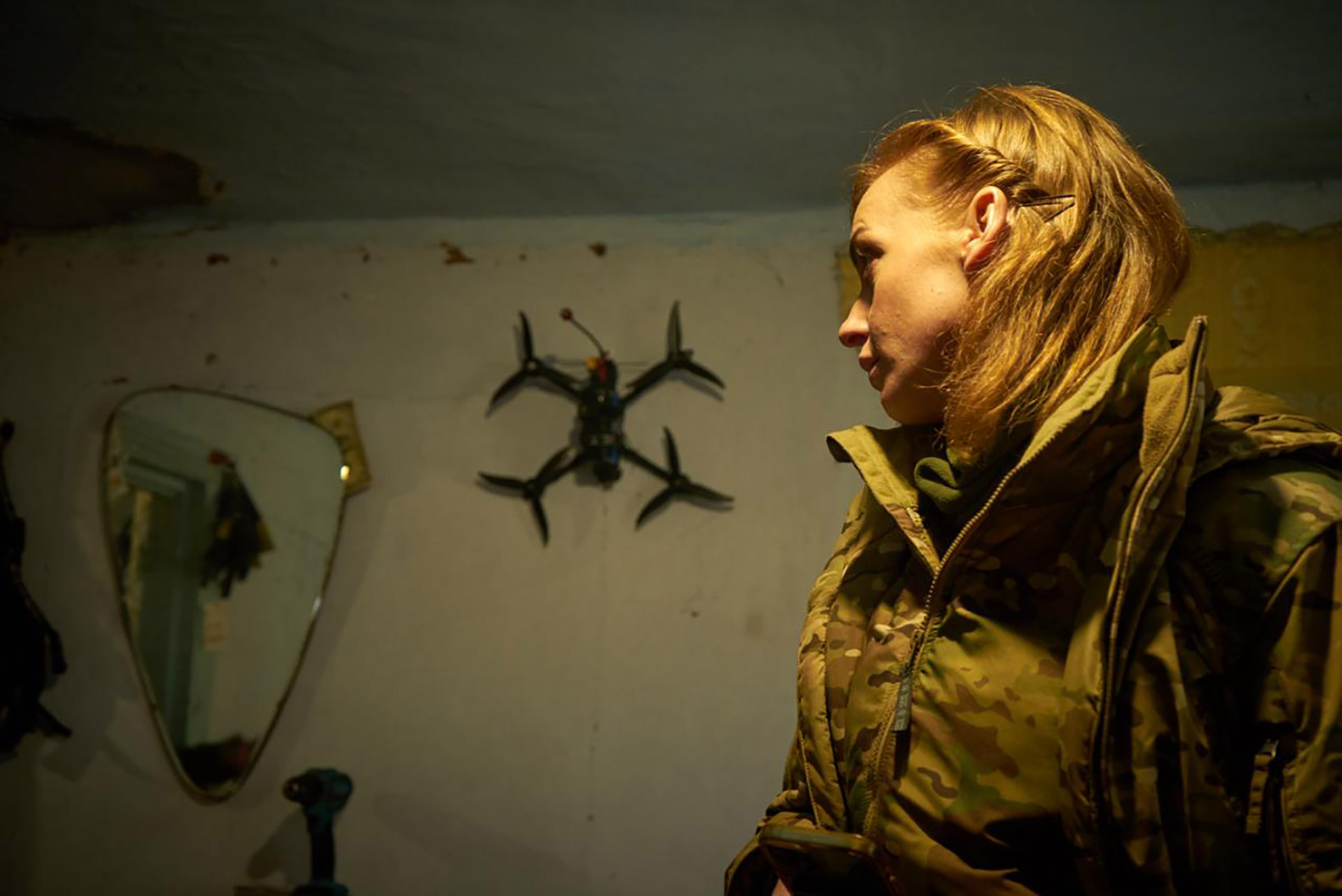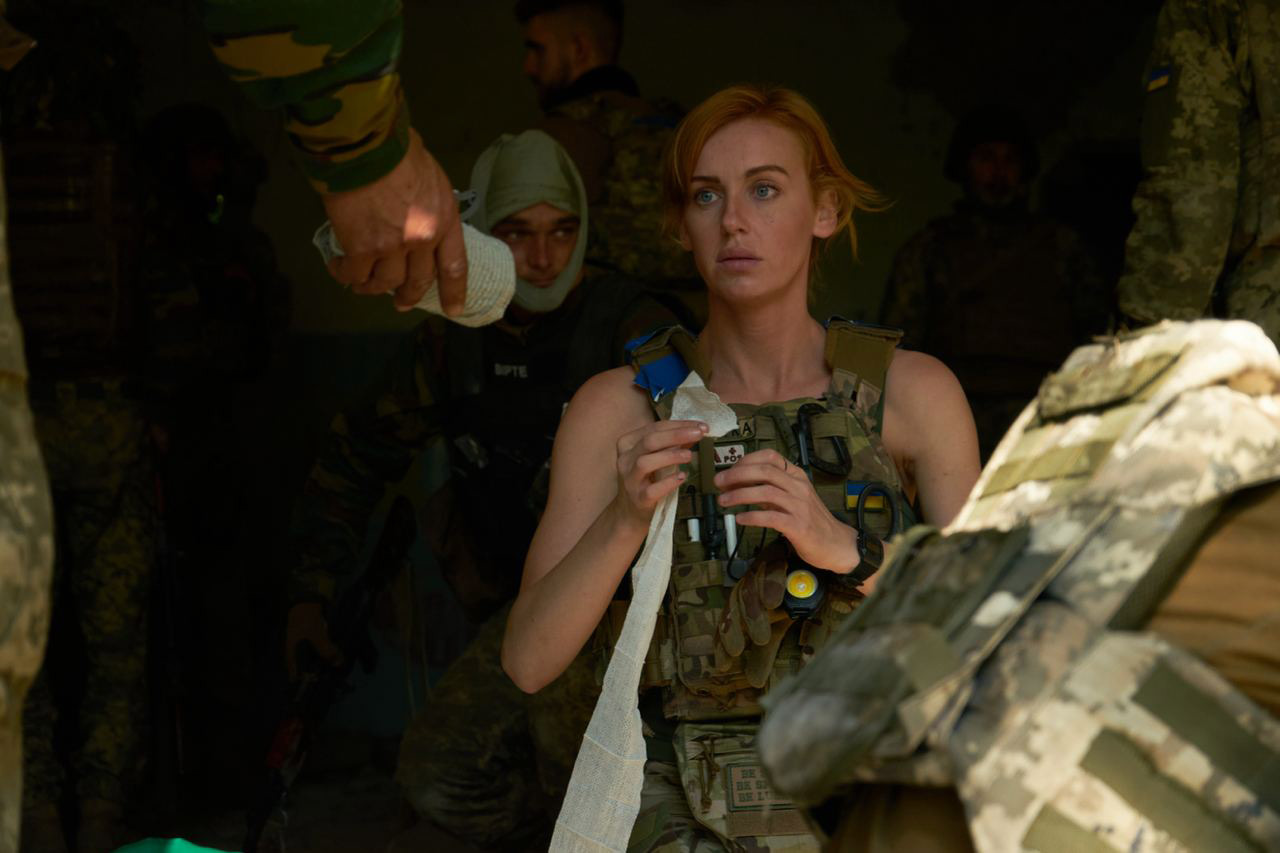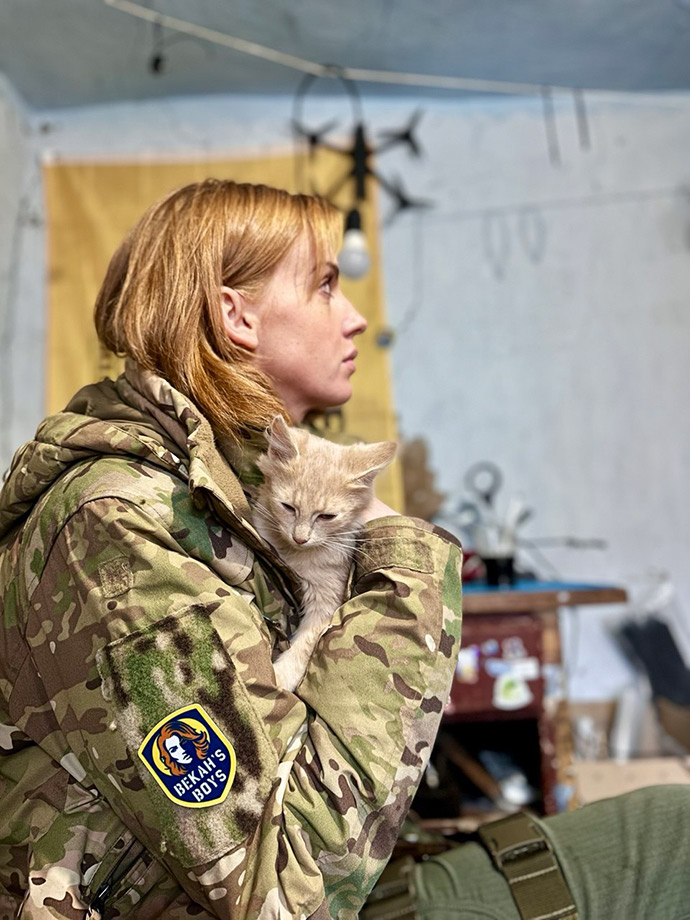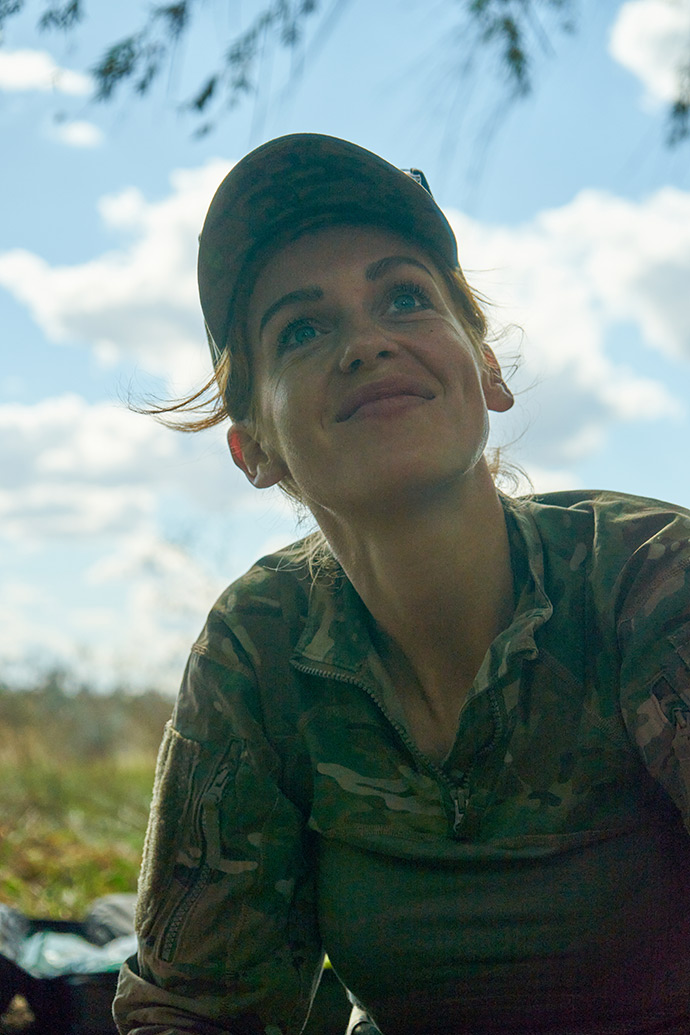Beka: The combat medic who said goodbye to a quiet life in the US and joined the Ukrainian Armed Forces

In March 2022, 30-year-old Rebekah "Beka" Maciorowski left Denver, Colorado and travelled more than 5,000 km to Ukraine.
As soon as she heard the news that Russia had launched a full-scale invasion of Ukraine, Beka knew she wanted to help Ukrainian people.
As a civilian in the US, Rebekah worked as a paramedic for over 10 years, volunteering as a medic in Venezuela, Mexico and Guyana in her free time.
Now Beka works as a combat medic in the 53rd Separate Mechanised Brigade named after Prince Volodymyr Monomakh. She is deployed to the Toretsk front.
Our first video call took place against the constant sound of artillery shelling on her side. Early on in our conversation, Beka warned me that she was on duty at a stabilisation point; injured soldiers could be brought in at any moment, she said. That was exactly what happened. Thirty minutes into our call, she had to leave to help wounded soldiers.
We next talked several days later. Although we spoke in English, Beka peppered her conversation with Ukrainian and Russian words. When talking about what she’s been through during the war, for example, she’d repeat: "It’s pyzd*ts [shit]."

Russian propaganda regularly reports that Beka (who they refer to as an American mercenary) is dead. The first time the Russians claimed they had killed Beka was in Bakhmut, Donetsk Oblast, in December 2022.
"I’m shocked first. And then I’m angry. I’m like, I’m not dead,you stupid motherf**kers. I’m alive. One time they [the Russians] said I was a female sniper. And they said they killed a famous American sniper, and I said ‘What the f**k? What the f**k are you doing?!’ It’s so stupid. Now I ignore it. For me, this is just khu*nya [bullshit]," Beka says.
Rebekah spoke to Ukrainska Pravda about why she decided to join the Armed Forces of Ukraine when the full-scale invasion started, how she overcomes the language barrier to talk to her brothers-in-arms, and the things she finds surprising about Ukrainian people.
Beka’s path to Ukraine
The first time Beka heard about Russia’s aggression against Ukraine was around 2016 from her Ukrainian coworkers in the US. They told her about the repressions that the Ukrainian people had endured in the USSR, the struggle for Ukraine’s independence, the Revolution of Dignity, and the Russian occupation of Crimea and parts of Donbas, and they shared with her how these events had impacted on their lives. Beka was fascinated by Ukraine’s history.
In 2021, Beka’s Ukrainian friends started to worry about the build-up of Russian troops on the border and the possibility of a full-scale invasion. Beka was on a shift at the hospital when she heard the news that the invasion had begun.
"I couldn’t believe that this is happening right now!" Beka recalls, her voice full of feeling. She was shocked that the whole world was watching, but no one started helping straight away because Ukraine is not a member of NATO. "And so I said, I should help. I have some experience of working in stressful situations."
In March 2022, Beka sent an official application to Ukraine’s Ministry of Health. She was granted permission to work in Ukraine almost instantly.
She told her boss that she wanted to use the vacation time she had saved up over several years – almost 10 weeks’ worth – to go to Ukraine and help people there. Beka’s boss wasn’t surprised by her decision. "I knew you would do this," she told Beka approvingly. "I was just waiting for you to tell me you were going to go."
Nor did Beka’s family – her brother and sister – bat an eyelid at her decision. No one had even considered that Beka, always so brave, would be able to watch the Russo-Ukrainian war unfold from across the ocean.
So Beka packed her bags and travelled to Ukraine.
"When I came to Ukraine, I said now that I’ve seen what’s happening, I can’t go home with a clear conscience without doing something to help. I don’t care if you’re American, European, or Ukrainian, you can’t stand by and say ‘Oh, it’s fine!’ Everyone has to come together to put an end to the war."

Initially Beka had planned to work in a hospital behind the front lines, but when she found out there was a shortage of combat medics at the front, she joined the military.
She didn’t go back to the US when her 10 weeks were up.
The army
Beka didn’t want to join the International Legion because she knew she would only be working alongside other foreigners there. "I wanted to work with Ukrainian soldiers," she stresses.
She started out as a paramedic in the 36th Marines Brigade.
"I was the first civilian woman to earn a blue beret. I was so honoured!"
She got her first call sign while working with the Marines, who called her "Mommy" as a joke.
"If they were injured, or they had some problems, they would come to me. And one of them said: ‘If we have some problem, we just call Mommy and she helps us.’ So this started as a joke and then it really started to take root. They always called me Mommy. I was like, everybody else gets cool call signs like Bullet, Biker, Ghost Rider, you know – and I was Mommy," Beka says with a smile.
During one of her first evacuation operations, Beka helped a seriously wounded soldier whose family was in Mariupol, which was encircled by Russian forces at the time.
"This guy was badly wounded, but he said: ‘Just make some plaster and let me go back [to the battlefield]. I can’t save my family, but I can keep on fighting for Ukraine.’ I was really moved," Beka says.
During her time working with the Marines in Donetsk Oblast, Beka met some soldiers from the 53rd Brigade. She helped them evacuate wounded soldiers, and they quickly became friends. That’s why she later joined the 53rd Separate Mechanised Brigade.
"The Marines were being transferred to the Kherson front, and they asked me to join them. But I was like: ‘Guys, you mean a lot to me, but the 53rd Brigade is my family.’ I stayed with them in Avdiivka."
As soon as she joined the brigade, Beka told her brothers-in-arms she no longer wanted to be Mommy. She asked them to just call her Beka.
"All my friends and family call me Beka. They [the soldiers] call me Beka, Bekusik, Bekichka [affectionate forms of the name Beka in Ukrainian – ed.]. It’s very sweet."
New soldiers frequently joined the brigade while it was stationed in Avdiivka. Beka would teach them tactical medicine. She was working around the clock both as a medic at a stabilisation point and evacuating wounded soldiers, and as an instructor.

"After Avdiivka, we were transferred to New-York. I can’t talk about that, but it was hell. Now we’re stationed near Toretsk," Beka says. She continues: "Every city in Donetsk Oblast that I lived in with my soldiers is now occupied. All the houses I lived in, when I would move in, I would take all of the pictures of the families off the walls and their valuable things, and I’d wrap them in a nice box and put it somewhere safe. Because the family will come back."
But now, most of the buildings where Beka and her fellow soldiers lived, or where she set up medical care points, have either been destroyed by Russian shelling or are occupied by Russian forces.
Daily life and brothers-in-arms
"I love the army in the sense that it’s all hell, but we’re together, we take care of each other. I remember one time we were going to the position, and we were wearing armoured vests and helmets and so on. Then my sergeant looked at me and saw my hands are kind of cold, and he was like: ‘Stop! Stop the car! Turn around!’ We had to go back to get some warm socks and gloves for me. And then we continued to the position."
Beka was very surprised to find that people in Ukraine always wear hats when it gets cold outside. Her brothers-in-arms tell her off when she forgets to put hers on.

She’s even more surprised that she’s not allowed to lift anything heavy. In the US she was used to having to carry everything herself, whereas in Ukraine even wounded soldiers offer to help her. Beka has never encountered sexism or been treated dismissively by men in the Ukrainian army.
Beka likes the way people in Ukraine use diminutive forms of names, like Vania for Ivan, Sasha for Oleksandr and Losha for Oleksii. At first she’d get confused and think she’d misremembered people’s names, but eventually she got used to it.
"It’s heartwarming to see the way people get to know each other. First Oleksandr, then Sasha, then ‘Sania, f**k!’" she says, laughing.
Beka’s pet peeve is that her brothers-in-arms are always adding water to liquid soap that’s about to run out instead of buying a new bottle.
"I’m always saying, ‘Guys, just tell me, I’ll go to the store and get us new soap, so don’t put water in there, okay?’ I’m a nurse and I know about infection control – and new soap fights germs better than soapy water."
Language and culture
"Have you tried learning Ukrainian?" I ask Beka.
"Kanyeshna [a bastardised ‘of course’ in Russian – ed.]," she replies convincingly.
Most of the soldiers Beka works with are Russian speakers because they’re from Luhansk and Donetsk oblasts, so Beka understands Russian better than she does Ukrainian. But every day she tries to find soldiers who speak Ukrainian to learn a few new words.
"I learned yesterday the word ‘tsikavo’," Beka tells me. "And I was like, ‘tse kava’ [‘this is coffee’]? Ah, ‘tsikavo’ is Ukrainian for ‘interesting’."
In over two years on the front line, Beka has learned how to overcome the language barrier. She talks to her fellow soldiers in a mixture of English, Russian and Ukrainian. She understands all the tactical medicine terminology in Russian and Ukrainian, but struggles with day-to-day conversation.
"I’m not here to make them speak English. I’m in Ukraine, I must speak the language of the people around me," Beka says.
"After we win the war, we can all speak Ukrainian. But first let’s fight to keep Ukraine so we have a language. Being a patriot in the rear is easy. Come to Donetsk region and speak Ukrainian. Come to fight, and then tell the military what language they should speak."

Beka’s added a lot of Ukrainian songs to her playlists since coming to Ukraine. She loves the national anthem and the Song about the Embroidered Towel [a popular Ukrainian song also known as Rushnychok, or My Dear Mother, based on a poem by Andrii Malyshko – ed.]. She listens to songs by Kozak System and Klavdiia Petrivna every day.
She loves Shchedryk (the Carol of the Bells) and has been many times to Pokrovsk in Donetsk Oblast, hometown of the song’s composer, Mykola Leontovych. The town is now being shelled and destroyed by Russian forces.
"I would want to show every Ukrainian a frontline village and bring them inside the house where someone lived before the war destroyed their life. They still have all of their books on the shelves, all of their clothes in the closets. But the people who lived there had to leave their homes, because Russia destroyed their life," Beka says.
"Ukrainians who are removed from this war need to come to these houses and see what the war does and what it can do to them if we don’t fight. Maybe then everyone will understand the cost of this war."
Anhelina Strashkulych, Ukrainska Pravda
Translation: Olya Loza
Editing: Teresa Pearce
